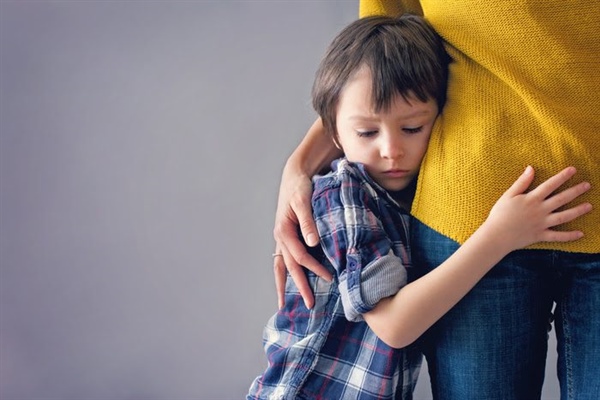Childhood Anxiety: Symptoms, Causes, and Care

Children are faced with different types of stressors throughout the day which can make it difficult for some kids to cope and function well. From home life, learning new skills, social pressure, academic performance, and even the foods kids eat - their “stress bucket” can overflow, leading them to feel anxious, fatigued, or easily frustrated.
While occasionally feeling worried, irritable, or worn out is normal, it’s NOT normal or healthy when a child feels anxious or acts out on a regular basis.
Sometimes anxiety manifests itself through physical symptoms while other times it looks more emotional. Either way, it can be difficult for kids to give words to their feelings and confusing for caregivers to identify what’s causing the anxiety and how to help.
Keep reading to learn the multiple signs of anxiety, possible causes, and how to alleviate it without the use of medication or therapy.
Signs Your Child May be Struggling with Anxiety
Toddlers and young children often have difficulty making sense of their feelings and clearly communicating them. This leaves parents to guess what’s really going on which can be frustrating and ultimately impact relationships and behavior at school.
Sometimes we see the following behaviors or physical symptoms in kids and assume it’s “just a phase” they’ll grow out of or not something to be concerned about...yet. But if your child displays 3 or more of the following symptoms, more days than not for a few months, it’s best not to ignore it as those issues likely won’t go away on their own.
Common signs and behaviors you may see if your child or teen is experiencing anxiety:
- Feeling restless, wound-up, or on edge
- Being easily fatigued and often exhausted
- Difficulty concentrating or mind “going blank”
- Being irritable, easily annoyed, or angry
- Feeling consistent or chronic muscle tension or tightness
- Needing to constantly stretch or “crack” their neck or back
- Difficulty controlling feelings of worry
- Sleep problems including difficulty falling or staying asleep, restlessness, or not feeling well-rested
- Frequent digestive problems such as indigestion, nausea, or even constipation
Causes of Anxiety: A Neurological Perspective
While you may have heard that certain environmental triggers and emotional stress can increase anxiety in children, one of the most common but overlooked ROOT CAUSES is birth trauma.
Examples of birth trauma include:
- Interventions using forceps or a vacuum; pulling on the baby’s head to assist with delivery
- C-section
- Fetal cord wrapped around baby’s neck, foot, or other body part
- Shoulder dysplasia
- Induction or epidural
In general, the longer labor and delivery lasts the more physical or chemical (medication) interventions stack up – leading to increased birth trauma.
These interventions cause STRESS on the baby’s nervous system which regulates their ability to adapt to changes in their environment, and coordinates other organ systems like digestion, immune function, heart rate, breathing and more.
When stress in the nervous system goes unchecked, it causes the brain and spinal cord to be wound up, tense, and worn out - all at the same time! This high tension causes problems in neural pathways between the brain and rest of the body, which can lead to common neurological issues like anxiety, ADHD, depression, or developmental delays if not addressed properly.
When chronic daily stressors (be that physical, emotional, or chemical) are added to a child’s life, they struggle to cope and thrive because their brain’s ability to properly send messages and perceive their environment has been been interrupted. It’s like a neurological traffic jam that won’t budge until the “stuck stress” is removed.
How Chiropractic Helps Anxious Kids
At Restore, we want to identify and correct the root cause of your child’s anxiety which is why we perform neurological tests on every new patient and create an individualized care plan to restore the health and function of their nervous system.
Why is testing our first step?
So we can identify where and how severe subluxation (stuck stress) in the nervous system may be. Most often, neurological scans of anxious kids show similar patterns:
- Subluxation in the upper cervical region (neck), brainstem and vagus nerve
- Energy inefficiencies in the motor nerves that control muscles
- A depleted energy reserve that’s needed to adapt to stress, as well as an autonomic nervous system that’s operating from a sympathetic state (fight or flight response).
Once we objectively identify if and where issues within the central and autonomic nervous system may be, our pediatric chiropractors can begin removing subluxation through gentle Torque-Release-Technique adjustments. With consistent adjustments over time, stress is removed from the nervous system allowing the brain and body to heal and communicate better, which naturally improves a child’s mental health and wellbeing.
We want your kids to live life to the full…with less anxiety, less depression, and less medication. If your child shows signs of intense emotions or behaviors that disrupt life or make getting along with others more difficult, make an appointment to get their nervous system scanned so we can begin their healing journey at the source of the problem. Improving the health and function of their nervous system will make all the difference in your child’s world.
Schedule Appointment